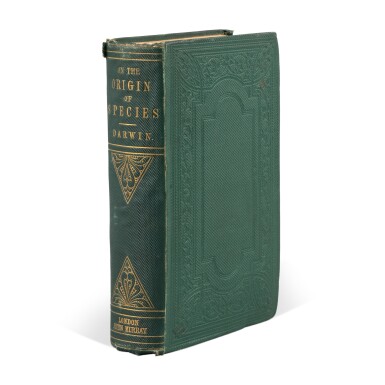
Property from an Important Chicago Collection
Darwin, Charles | "the book … that initiated the most cataclysmic change in human thinking within the last four hundred years"
Auction Closed
June 26, 02:43 PM GMT
Estimate
80,000 - 120,000 USD
Lot Details
Description
Darwin, Charles
On the Origin of Species by Means of Natural Selection, or the Preservation of Favoured Races in the Struggle for Life. London: John Murray, 1859
In 12s (7 7/8 x 5 in.; 199 x 126 mm, uncut). Half-title, half-title verso with quotations by Whewell and Bacon only, folding lithographed diagram by W. West indicating Darwin's views of of possible sequences of evolution facing p. 117, 32-page publisher's catalogue dated June, 1859 bound at end (Freeman's form 3); a few leaves lightly creased, short marginal tear to fourth preliminary leaf (contents), tiny hole and chip, respectively, to lower margins of C3, 4, five or six pages with pencilled underscoring or marginal reader's marks, faded commentary on the Darwin-Wallace controversy written on half-title, extract of a letter from Darwin to Wallace written on verso of front free endpaper. Publisher's blind-panelled green grained cloth (Edmonds & Remnants, ticket), spine gilt (Freeman's variant b, no priority), brown-coated endpapers; inner hinges cracked, corners bumped, ten-mm tear to cloth at head of rear joint, front free endaper chipped at fore-edge and stained, evidently from removal of a label, withal, a very good, unrestored copy. Half russet morocco folding-case, black morocco label gilt.
First edition of "the most influential scientific work of the nineteenth century" and "the most important biological work ever written" (Horblit, Freeman). Darwin had assimilated the researches and observations from his five years as naturalist aboard the survey ship H.M.S. Beagle into the essential formulation of his theory of natural selection more than two decades before Origin of Species appeared, but he may not have published his revolutionary theory during his lifetime had not Alfred Russel Wallace independently come to a nearly identical conclusion about the transmutation of species. After the Linnean Society read and published jointly Darwin and Wallace's preliminary expositions of the theory of evolution, Darwin rushed to prepare for publication an epitome of the "big species book" that he had been working on since 1856. (Darwin's first suggestion for a title, An Abstract of an Essay on the Origin of Species and Varieties through Natural Selection, was rejected by his publisher as too tentative and obscure).
Originally conceived as a work that might be printed on four or five sheets of paper, On the Origin of Species evolved during the eight months of its writing into a volume of nearly 500 pages. The final scope of Origin of Species prompted Darwin to abandon plans for his "big book," although he salvaged much of the first part of the manuscript for The Variation of Animals and Plants under Domestication, published in 1868.
Bern Dibner's Heralds of Science describes On the Origin of Species as "the most important single work in science." The entire text is essentially an introduction to, and amplification of, the iconoclastic thesis that Darwin abstracts at the beginning of chapter 4: "many more individuals are born than can possibly survive ... [I]ndividuals having any advantage, however slight, over others, would have the best chance of surviving and procreating their kind ... [A]ny variation in the least degree injurious would be rigidly destroyed. This preservation of favourable variations and the rejection of injurious variations, I call Natural Selection." Origin of Species caused an immediate sensation.
Of the first edition of 1,250 copies, fifty-eight were distributed by Murray for review, promotion, and presentation, and Darwin reported that the balance was sold out on the first day of publication. Five further editions, each variously corrected and revised, appeared in Darwin's lifetime, as did eleven translations. Perhaps most significantly, On the Origin of Species inspired other scientists to take up the banner of evolution. Darwin's biographer Janet Browne credits "the ultimate triumph of evolutionary theory" to the unrelenting efforts of four of the author's friends: the geologist Charles Lyell, the botanist Joseph Hooker, the American naturalist Asa Gray, and the zoologist and anatomist Thomas H. Huxley.
In his 2002 Bradley Lecture at the Library of Congress, David Quammen noted that readers of Origin of Species, whether approaching it "as a scientific work or as an historical and literary landmark," should prefer the first edition to the five later lifetime editions, all revised by the author: "That's the book, with all its daring freshness and flaws, that initiated the most cataclysmic change in human thinking within the last four hundred years." The Preface to the published lecture, by Prosser Gifford, summarizes Darwin's enduring influence: "The evolutionary sciences now encompass the macro scale—cosmology, astronomy, geology, oceanography, paleontology, demography—and the micro scale—molecular genetics, neurobiology. The analysis of DNA enables us to trace the evolution of biological forms over millennia. Darwin's patient and painstaking observations of barnacles and finches began an intellectual transformation that now stands at the center of our understanding of ourselves and our universe."
REFERENCES:
Dibner 199; Ellis/Mengel 628; Freeman 373; Garrison-Morton (1991) 220; Grolier/English 96; Grolier/Horblit 23b; Grolier/Medicine 70b; Heirs of Hippocrates 1724; McGill/Wood 310; Norman 593; Printing and the Mind of Man 344b; Waller 10786; cf. Janet Browne, Darwin's Origin of Species: A Biography (New York, 2006); David Quammen, The Origin of Species: Descent of a Text, with Modification (Library of Congress, 2002); Michael Ruse & Robert J. Richards, eds., Cambridge Companion to the "Origin of Species" (Cambridge, 2009)
PROVENANCE:
Paton & Ritchie, Booksellers & Stationers, Edinburgh (ticket) — Fredeick R. Jones, "Adwell," Torre, Torquay (ticket)
